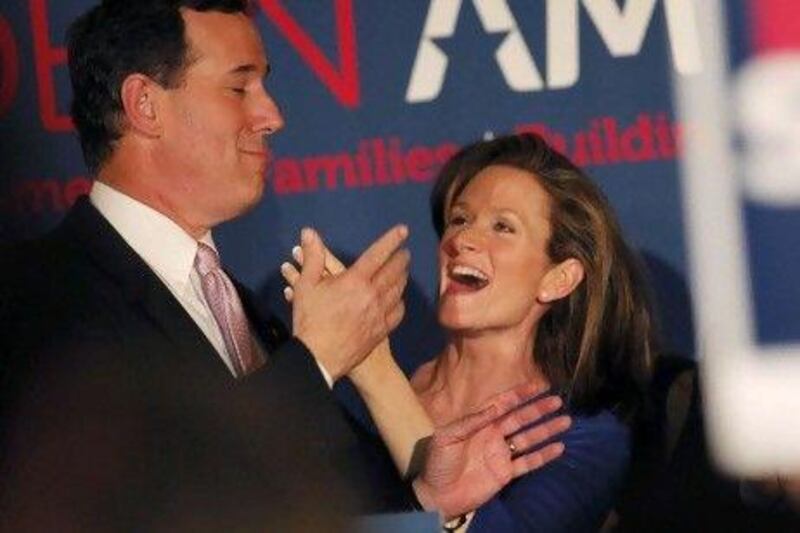WASHINGTON // Mitt Romney's losses in Alabama and Mississippi underscore a stark reality: the core of his party does not want him.
And that lingering conservative dissatisfaction - seen on Tuesday night - threatens to follow Mr Romney into a general election matchup against a Democratic president whose ability to inspire his base is not in question.
Despite a win yesterday in the Hawaii caucus, Mr Romney's huge lead in the race for delegates to this summer's GOP nominating convention seemed forgotten for a night as Rick Santorum revelled in twin victories handed to him by conservatives and evangelicals who dominate the Republican electorate in the party's only remaining regional stronghold - the South.
Mr Santorum's success and Romney's failure exposed deep divisions within a party torn between a conservative base that is looking for a candidate who is pure on Republican orthodoxy and the rest of the party, which is looking for a nominee able to beat President Barack Obama.
Tuesday's outcomes also ensured the increasingly nasty slog towards the Republican presidential nomination will consume even more of Mr Romney's time, energy and money when he would rather be focused solely on the general election, and Mr Obama.
"We will compete everywhere," Mr Santorum told cheering supporters in Lafayette, Louisiana.
In addition, Mr Santorum's victories - in states Newt Gingrich recently declared essential to his candidacy - suggested that the former leader of the House of Representatives' path to victory, already in question before Tuesday's contests, is virtually nonexistent. Aside from winning his home state of Georgia last week, he has lost nearly two dozen consecutive contests spanning more than seven weeks.
Despite his losing streak, Mr Gingrich vowed to fight on until his party's nomination in August - and crowed about Mr Romney's weaknesses.
"The fact is, in both states, the conservative candidates got nearly 70 per cent of the vote. And if you're the front-runner - if you're the front-runner and you keep coming in third, you're not much of a front-runner," Mr Gingrich said.
Indeed, Mr Romney has consistently struggled to win over his party's most conservative voters - evangelicals and Tea Party supporters among them - even in states he has won. But that opposition proved devastating on Tuesday.
Half of voters in Alabama and Mississippi said Mr Romney's positions were not conservative enough. Among self-described conservatives, that spiked to six in 10 in each state. And among all Republican voters, just a third in Mississippi and about a quarter in Alabama called Mr Romney's positions on the issues about right.
Mr Romney made no public appearances to offer a defence on Tuesday night.
Instead, his campaign offered a statement that congratulated Mr Santorum, while reminding people of his huge delegate advantage. It seemed an unusual way to try to demonstrate confidence, but that was exactly what the statement did, suggesting he would ultimately win the nomination battle.
"With the delegates won tonight, we are even closer to the nomination," Mr Romney said in the statement. "Ann and I would like to thank the people of Alabama and Mississippi. Because of their support, our campaign is on the move and ready to take on President Obama in the fall."
Despite Tuesday's performance, Mr Romney continues to be the overwhelming Republican favourite, both on paper and in the minds of Republican voters across the nation. A whopping 74 per cent of likely voters think Mr Romney will capture the Republican nomination, according to an ABC News/Washington Post poll conducted last week.
And he picked up more delegates than Mr Santorum did on Tuesday, thanks to a nine-delegate sweep in American Samoa and Hawaii.
Coming into this week's contests, Mr Romney had more delegates than his rivals combined, and is amassing them at a rate that puts him on track to clinch control of nomination before the GOP convention opens in late August. A tally shows him with 494 of the 1,144 delegates needed to win the nomination. Mr Santorum has 251, Mr Gingrich 131 and Ron Paul 48.
With a single victory on Tuesday in either Alabama or Mississippi, Mr Romney could have emerged with a far different storyline. Instead, his losses reinvigorated his underfunded and understaffed opponents.
Mr Santorum's wins allowed him to make the most convincing argument to date that it's finally time for divided conservatives to rally behind a single Romney alternative. And it was likely that conservative leaders will join that call in the coming days.
"The time is now for conservatives to pull together," Mr Santorum said.






